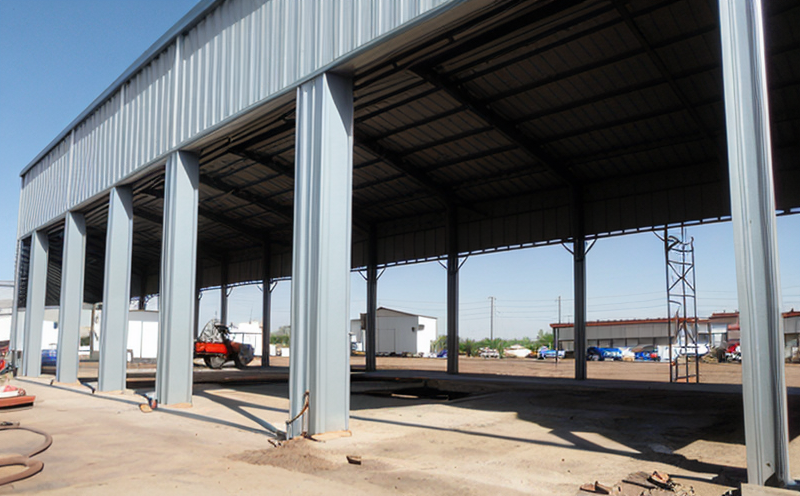ASTM A370 Steel Hardness Correlation
The ASTM A370 standard is one of the most widely recognized and utilized standards in the steel industry. It provides a comprehensive set of procedures for testing properties such as tensile strength, yield point, elongation, and reduction of area. However, within this broader scope lies the specific ASTM A370 Steel Hardness Correlation test, which focuses on determining the hardness of steel specimens using various hardness testers.
This service is particularly crucial for ensuring quality control in manufacturing processes where precise measurement of material properties is paramount. By correlating hardness values with other mechanical properties like tensile strength and yield point, manufacturers can enhance their product's reliability and performance. This correlation also aids in process optimization by providing insights into how processing parameters affect the final product.
The ASTM A370 Steel Hardness Correlation test involves several key steps that ensure accurate results. Specimen preparation is critical; samples must be cut from the parent material or heat-affected zones if applicable. The choice of hardness tester—whether Brinell, Rockwell, Vickers, or Knoop—depends on the specific requirements and nature of the steel being tested.
The testing process itself requires precision to avoid any external factors influencing the results. This includes maintaining consistent temperature, humidity levels, and ensuring that the hardness tester is properly calibrated before each use. Once the test is conducted, it generates a correlation chart linking the hardness value with other mechanical properties of the steel.
Understanding these correlations helps in material selection for various applications, such as automotive components, construction materials, and aerospace parts. For instance, higher hardness values often indicate greater resistance to wear and tear, which is essential for components subjected to heavy loads or high stress conditions. Conversely, lower hardness might be preferred for certain applications where flexibility and formability are more critical.
Furthermore, the ASTM A370 Steel Hardness Correlation test plays a vital role in compliance with international standards and regulations. It ensures that products meet the stringent requirements set by organizations like ISO and EN, thereby enhancing market confidence and acceptance worldwide. This correlation also facilitates easier communication between suppliers and clients regarding material specifications.
In conclusion, ASTM A370 Steel Hardness Correlation is a fundamental service in building & infrastructure testing that guarantees high-quality materials used in construction projects. By providing accurate hardness data alongside other mechanical properties, this test supports robust quality assurance programs and fosters trust within the industry.
Scope and Methodology
The ASTM A370 Steel Hardness Correlation service covers a range of procedures designed to measure the hardness of steel specimens accurately. This includes detailed instructions on specimen preparation, selecting appropriate hardness testers (Brinell, Rockwell, Vickers, Knoop), and ensuring proper calibration and environmental conditions.
- Specimen Preparation: Samples are cut from the parent material or specified zones to ensure representativeness.
- Selecting Appropriate Hardness Tester: The type of hardness tester chosen depends on the specific requirements and characteristics of the steel being tested.
- Calibration and Environmental Conditions: Ensuring that all instruments are correctly calibrated and operating in controlled environments prevents discrepancies in results.
The methodology emphasizes meticulous attention to detail throughout each step, from sample preparation to final testing. This approach ensures reliable and consistent hardness data across different batches or samples of steel. The correlation between hardness values obtained through these tests provides valuable insights into the material's properties, aiding in quality control measures.
Why Choose This Test
The ASTM A370 Steel Hardness Correlation test is essential for ensuring precise and reliable measurements of steel hardness, which are critical for maintaining product quality. By correlating hardness values with other mechanical properties like tensile strength and yield point, this service offers several key benefits:
- Enhanced Quality Control: Accurate hardness data helps identify variations in material properties early on, allowing for timely adjustments to manufacturing processes.
- Improved Material Selection: Understanding the correlation between hardness and other mechanical properties aids in selecting the right steel grades for specific applications.
- Compliance with International Standards: Meeting stringent requirements set by organizations like ISO and EN enhances market confidence and acceptance globally.
- Easier Communication: Providing clear, standardized hardness data facilitates better understanding among suppliers and clients regarding material specifications.
In addition to these advantages, the ASTM A370 Steel Hardness Correlation test supports robust quality assurance programs by ensuring consistent product performance. This service is particularly beneficial for industries where high-quality materials are critical, such as automotive manufacturing, construction, and aerospace engineering.
International Acceptance and Recognition
- The ASTM A370 Steel Hardness Correlation test is widely accepted in North America, Europe, and Asia. Many countries have adopted this standard as the basis for their own testing protocols.
- It aligns with international standards such as ISO 6508-2 and EN 10002-2, ensuring compatibility and consistency across different regions.
- The correlation between hardness values and other mechanical properties is recognized globally, making it easier for manufacturers to meet global market demands.
This widespread acceptance contributes to increased trust in the quality of products tested using this method. Compliance with ASTM A370 ensures that materials meet high standards, which is crucial for maintaining a competitive edge in international markets.





